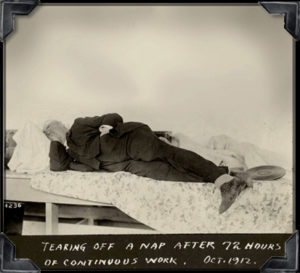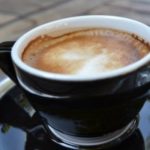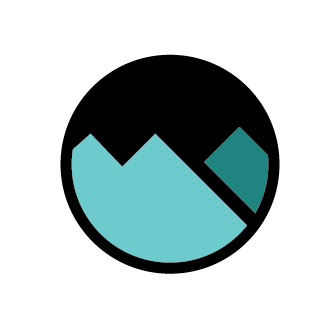“Nature has not intended mankind to work from eight in the morning until midnight without that refreshment of blessed oblivion which, even if it only lasts twenty minutes, is sufficient to renew all the vital forces.”
~ Winston Churchill from his book The Gathering Storm
 In a prior post called How to Sleep Like A Hero, we touted the power found in a good night’s sleep. Turns out you can harness a little piece of that power mid-day and reap great rewards.
In a prior post called How to Sleep Like A Hero, we touted the power found in a good night’s sleep. Turns out you can harness a little piece of that power mid-day and reap great rewards.
If high-octane coffee, chocolate bars and 5-hour energy shots have become part of your mid-day routine; power napping may be your new broccoli. There is a perception that naps are for senior citizens, slackers, sick people and little kids but this is simply not true. Others have discovered the power of napping and perhaps you should too.
Naps boost creativity.
Have you ever been stuck on something mentally only to wake up after a good night’s sleep or quick nap with a solution? Research conducted at Georgetown’s University Center for Functional and Molecular Imaging found the right side of the brain – the one associated with creativity – is highly active during naps.
Long before scientists began to prove napping was useful, famous creators were already in on the secret.
Albert Einstein would sit in a chair holding spoons in his hands so that when he drifted off and they hit the floor, he would be awakened by the clatter.
Thomas Edison held ball bearings over metal pie plates.
 Salvador Dali held keys or coins.
Salvador Dali held keys or coins.
Referred to as “micro naps”, the technique sends one into hypnagogia; a “conscious dreaming” state of mind achieved when moving from wakefulness to sleep. As the body relaxes, cognitive and emotional focus also releases, allowing your mind to wander in search of solutions and inspiration. Next time you are stuck on a problem, give it a try.
Naps boost attention span, focus and alertness.

A few minutes of shut-eye can recharge your batteries and thus increase productivity.
“A brief nap may provide greater alertness for several hours, and can improve attention, concentration, accuracy, and productivity,” says Dr. Neubauer, an Associate Director from the Johns Hopkins Hospital Sleep Disorders Center in this Prevention article.
Just ask a first year medical resident or an airline pilot who has been flying for 8 hours what they needs most. The answer: a nap.
Napping gives your mind a break and reduces stress.
As long as the “lazy bones” stigma doesn’t create more stress, napping is great for your your mind, body and soul. In our fast paced, tech filled world, we are bombarded by stimuli from all angles. Even if you don’t actually catch a single “z”, your brain will be grateful for a little break from the noise and chatter. Whose brain couldn’t use a chance to rejuvenate?
Napping boosts memory.
According to this piece of research, the simple act of falling asleep in and of itself may be enough to boost your memory. In the study, there was no difference in ability to recall words after a short 6 minute nap versus a longer nap and both naps were more effective at boosting recall than being awake. Need more proof? This study found that a nap intervention was better at enhancing recall than caffeine.
Naps also make you happy.
What’s the universal solution for a cranky toddler? Nap time.
If you need proof, walk into your local day care center around mid-day and watch how temperaments change post-snooze. If you are feeling a little tired and cranky, it might be time to put your head on your desk for 5 minutes.
Napping well is all about the timing
Even if you don’t work for a progressive company like Google or Hubspot that invests in company nap spaces, it doesn’t mean a noontime snooze is out of the question.
There is a sweet spot though for making the magic happen. There is an ideal time of day and duration to take a nap that leaves you refreshed and ready to tackle the next task.
Our bodies begin to tire after about 8 hours of wakefulness. It’s part of the reason why you are trolling your desk for chocolate around 3pm (depending on when you woke up.) Hitting that natural 8-hour slump is a signal it’s time to take a break. If you want to get really precise about your “Ultimate Nap” timing, check out this napwheel developed by Dr. Sarah Mednick, a Harvard educated Associate Professor from the University of California, who specializes in nap research. She is so sold on napping, she wrote a book.
How Long Should You Nap?
Here’s the thing about a daytime nap: you need to stay away from the middle ground.
You either have to go big and take a long 90 minute (or longer) nap to complete a full REM cycle or you need to keep it short – under 30 minutes – to keep you from entering the deeper stages of sleep that will make you feel groggy and more tired than you were before you took the nap.
Referred to as “sleep inertia” by sleep experts, the adverse effects of naps in this in-between time can take a long time to wear off and make you feel worse than you did before you napped.
In a study by NASA examining alertness in pilots, 25.8 minutes was deemed the perfect length to improve performance and alertness by 34%.
 Scientists from Britain discovered another nap option: the caffeine nap or “napuccino” – where you drink a cup of coffee right before you put your head down for 15 minutes – to be more effective at improving cognitive functioning than napping (or drinking a cup of coffee) alone.
Scientists from Britain discovered another nap option: the caffeine nap or “napuccino” – where you drink a cup of coffee right before you put your head down for 15 minutes – to be more effective at improving cognitive functioning than napping (or drinking a cup of coffee) alone.
If you need a mental break and don’t have a lot of time, a few minutes may do the trick. If your body needs a physical break, and time is not an issue, 90 minutes may be your best solution. If you are willing to step out of the box and incorporate the benefits of a daytime nap into your life, be a study group of one and take the time to discover what works best for you and your needs. For ideas on how to Nap Like A Pro – check out this post.
We would love to hear about your daytime napping experiences (does it help? is your company nap friendly? do you have a good technique for making it happen?) Please give us your input in the comments below!

I told my grhtmdonaer how you helped. She said, “bake them a cake!”
Haha Patty! While we are a fitness company that tries to be mindful of healthy eating habits, we also LOVE cake! 🙂
This is very true, an afternoon power nap is far better than a pop.
I don’t know it makes me mad because I wish I didn’t have to wake up lol!
i like naps, they make me feel good!
good article
Good article; appreciate the information.
yes an after work nap is refeshing
My boss frowns on my afternoon naps!
Hi Fuzzy! Maybe you should forward your boss a link to this post. 😉
Maybe I should incorporate napping during the day. So that when I wake up I could be more alert and have more creativity. I really like to sleep but it’s hard to take a nap during the day.
I love taking a nap, however I very seldom get a chance to take one.
Ditto Letitia! Days at work can especially be busy making a nap less than practical. The best thing to do is always get a good night’s sleep so a nap isn’t necessary (but could be a nice little bonus if you do find the time).
For some reason, my boss frowns on my taking a nap at work. Maybe he should try it.
Last afternoon nap I took was several years ago
Great night sleep after the rain. Cool mornings make for great sleep.
Interesting
I love stealing away for a nap – breaks up the monotony of tasks – until it is a habit – then part of the routine – New Normals